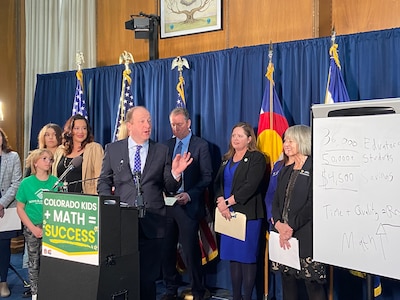Gov. Jared Polis and lawmakers hope to reach 50,000 Colorado students struggling with math skills through after-school tutoring while also offering more training to teachers and even parents.
Math scores have dropped in Colorado and the nation after three severely disrupted school years. Leaders hope the math initiative can turn around that trend and give students strong foundations as they enter high school and encounter more challenging material.
“We’ve seen a lot of kids who lost a couple of years during COVID,” said House Education Chair Barbara McLachlan, a Durango Democrat and bill sponsor. “And so we want to get them caught up for what they missed and get them to where they should be now, so at the end of the school year, they’re ready to go into the next year.”
Leaders unveiled the bipartisan math initiative Tuesday, though Polis had hinted at the outlines of the program in a January budget request. In contrast to Colorado’s yearslong efforts to improve reading proficiency, the program is voluntary and designed as a short-term intervention.
School districts, charter schools, and after-school programs run by community groups could apply for three-year grants to run math tutoring programs. Polis said the proposal is based on evidence that additional learning time can result in higher achievement. It should also save parents money on after-school care, he said, predicting that demand will be high.
Programs that work with high-needs students and with students in the transition years from elementary to middle school and from middle to high school would get priority, as would those using evidence-based math instruction.
The bill proposes setting aside $25 million for tutoring to be distributed over the next two years, plus another $3 million for other programs.
In addition to the after-school tutoring initiative, the bill would:
- Encourage — but not require — school districts to identify students performing below grade level in math, tell their parents that they’re struggling, and offer interventions.
- Make training programs available to both teachers and parents on a voluntary basis.
- Require the Colorado Department of Education to maintain a list of evidence-based math programs. However, school districts would not be required to use evidence-based math curriculum or make any changes to instruction.
- Require teacher preparation programs to train new teachers in evidence-based math instruction practices, including how to help students who are below grade level and those who have learning disabilities.
- Require preschool teachers to learn how to help young children understand and work with numbers.
The bill does not define “evidence-based,” instead deferring to the state education department to highlight curriculum and instructional programs that experts believe will best serve students.
Math initiative aims to reverse pandemic-era declines
Since 2020, math scores have declined more than reading scores have, and middle school students showed greater declines on last year’s Colorado standardized tests than younger students did. Colorado ninth graders posted the biggest drops when compared with their peers in 2019. On the National Assessment of Educational Progress, or NAEP, often known as the nation’s report card, just 28% of Colorado eighth graders tested proficient, the lowest rate in a decade.
“While many districts are doing great work to reverse that trend, additional support from the state, specifically around math achievement, will really help move the bar,” Polis said.

Because each stage of math learning builds on the previous one, disrupted learning in one grade can cause trouble for years down the road.
State Sen. Janice Marchman, a Loveland Democrat and bill sponsor, works as a middle school math interventionist when she’s not at the Capitol. Her job is to ensure students are ready for high school and achieve the algebra competency they’ll need in a wide range of professions.
Her job has gotten harder during the pandemic as students missed out on consistent instruction. Often she’s going back to fractions and multiplication.
“A lot of what I do is starting back with the grade four and grade five curriculum,” she said.
McLachlan predicted teachers would be eager to take the training and improve their own skills, even if it’s not required. The state hopes to reach 36,000 teachers. The bill calls for a “train the trainer” approach in which teachers who participate could take ideas for improvement back to their home schools. Many elementary teachers, in particular, need more help, she said.
“We get a lot of people who teach elementary because they don’t need to do the math,” McLachlan said. “And so they focus on reading, maybe, because that’s more fun. But we need to get really good educators for math.”
The bill would also make training materials available to parents to support their children at home, something many parents find challenging, especially as schools have adopted new approaches that differ from how parents learned to do math when they were young.
Marchman is particularly excited the bill includes funding for a digital math accelerator, a computer program that will be aligned with state standards and can offer personalized instruction. The program could allow students to learn while freeing up teachers and tutors to support students in areas where they need more focused help, she said. Polis said the state, by paying for a master license, can save school districts money that can be put back into the classroom.
Senate Minority Leader Paul Lundeen, a Monument Republican and bill sponsor, said the bill combines rigorous instruction with local flexibility and provide public money to support parents and out-of-school learning, something he would like to see more of.
Math proposal differs from Colorado’s literacy strategy
Colorado is not alone in looking for ways to boost math achievement. Alabama recently passed a major numeracy law and several other states are considering such bills now.
“There is a lot of traction around math,” said Christy Hovanetz, senior policy fellow at the Florida-based nonprofit ExcelinEd, which recently released recommendations for state-level policy changes. With low test scores in nearly every state, “policymaking bodies have really seen a need to act this session.”
ExcelinEd wants states to adopt high-quality curriculum, train prospective and current K-8 teachers on math instruction, administer math screenings early in the school year, and notify parents if their children are struggling.
Relying on voluntary programs and grants can result in a patchwork of practices that shortchanges kids, Hovanetz said.
“I think it’s very reasonable for a state to say, here are the four, five, six curriculum series that align with our state standards, are proven to be effective, and are easy to use for teachers,” she said.
That’s how Colorado has approached efforts to improve reading proficiency since 2019, when lawmakers revamped the 2012 READ Act. Frustrated with limited progress under the original program, Colorado now requires the use of evidence-based reading curriculum and training on reading for all K-3 teachers.
It was a major undertaking interrupted by the pandemic and represented a sea change in a state accustomed to local control. Many schools only recently have rolled out new curriculum and completed training for all teachers.
While Colorado’s math scores declined from 2019 to 2022, even before the pandemic fewer than 40% of middle-school students showed proficiency on state math tests.
Polis didn’t explain why he’s not calling for a more comprehensive overhaul of math instruction.
“That’s a different discussion,” he said. “This is a grant program for after-school programs. It’s additional time on task for those who need it to be able to improve math performance.”
Nonetheless, the proposal calls for a far greater state role in math and incorporates math into many existing school improvement efforts.
For example, under the bill, schools placed on a state watchlist due to low test scores would have to present plans specifically related to improving math instruction. Schools receiving grants to help ninth graders get a solid start in high school would have to show how they’re incorporating math.
In addition, the state is rewarding 12 schools that improved students’ math scores from 2019 to 2022 with $50,000 grants from federal pandemic relief money and plans to share lessons from those schools’ success with other educators.
The schools are: Thornton Elementary School, Roosevelt Charter Academy and Chipeta Elementary School in Colorado Springs, Fowler Junior High School, Hi-Plains High School in Siebert, Chatfield Elementary School in Grand Junction, Moffat Senior High School, La Jara Elementary School, Minnequa Elementary School in Pueblo, Avondale Elementary School, Rocky Mountain Elementary School in Longmont, and Hudson Elementary School.
The schools all increased the number of students performing above grade level despite pandemic disruptions, and many serve large populations of low-income students and English learners.
Minnequa Principal Katie Harshman noted that five years ago, her school faced possible closure due to persistent low test scores. Now it’s being recognized by state leaders. The turnaround required an effort by the entire community, but two elements included in the statewide math initiative were key — teacher training and personalized learning.
Chalkbeat senior reporter Ann Schimke contributed reporting.
Bureau Chief Erica Meltzer covers education policy and politics and oversees Chalkbeat Colorado’s education coverage. Contact Erica at emeltzer@chalkbeat.org.






